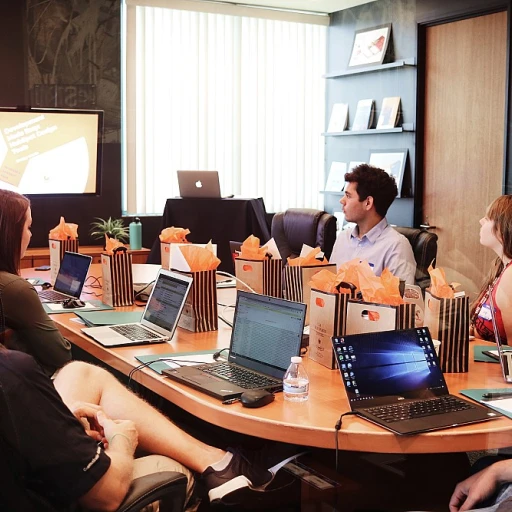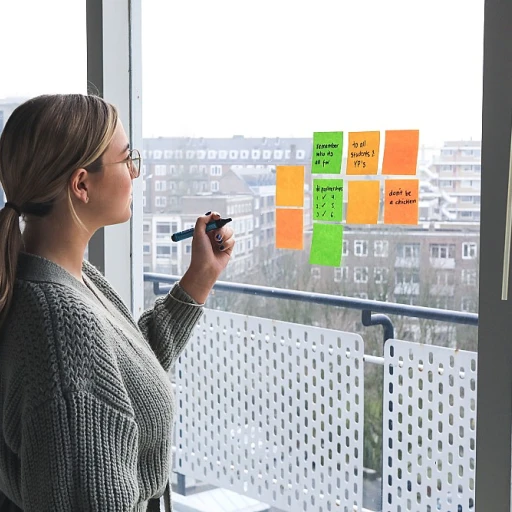
Understanding the Dynamics of Healthcare Meetings
Grasping Healthcare Meeting Environment
Healthcare meetings are quintessential to the functioning of healthcare teams. They serve not just as planning and strategy sessions but are crucial moments where reflections on patient care can lead to actionable insights. However, understanding the inherent dynamics in these settings is vital for effective communication and decision-making. Healthcare professionals are often pressed for time, which can inadvertently impact the flow and productivity of meetings. This time constraint makes it essential for leaders to facilitate meetings with clarity by centering discussions on core priorities. Key Considerations in Healthcare Meetings:- Team Cohesion: A tight-knit group enhances engagement during discussions. An atmosphere that encourages open sharing and respect lays the foundation for effective team meetings. Team members should feel their reflections are valued, paving the way for collaborative care delivery.
- Gratitude and Recognition: Expressing gratitude towards healthcare workers not only boosts morale but reinforces the value of their contributions in team meetings. Recognizing efforts can inspire members to express daily reflections on ways to enhance patient care.
- Study of Best Practices: Integrating study findings from healthcare veterans can shed light on innovative practices that could be implemented during meetings. It helps align team members with established strategies that resonate with broader health outcomes.
- Emotional Intelligence: Emotional intelligence plays a pivotal role in leadership, as it helps in navigating the diverse emotions present in healthcare meetings, forming the backbone for meeting reflections that drive insightful changes.
The Role of Emotional Intelligence in Leadership
Cultivating Emotional Connections in Healthcare Settings
In healthcare meetings, the ability to empathize and engage with team members’ emotions is a fundamental aspect of effective leadership. Emotional intelligence plays a significant role in understanding the dynamics of these meetings, where the nature of work can be intense and emotionally charged. Healthcare workers often face challenging situations that require not just technical expertise but emotional sensitivity and support for one another. Engaging in daily reflection can be immensely helpful in improving one’s emotional intelligence within the team environment. Taking time each day to consider personal and team interactions allows leaders and healthcare professionals to gain insights into their emotional responses to various patient care situations. This reflective practice encourages a mindset of gratitude and can lead to better decision-making processes in future meetings. Quotes and stories of inspirational reflections from veteran healthcare workers or personal meeting reflections can greatly impact the team’s overall morale. Sharing these narratives at the beginning or end of a meeting sets a positive tone and fosters a supportive environment. The goal is for each member of the team to feel valued and understood, reinforcing their commitment to high-quality patient care delivery. Reflecting on interactions and meeting outcomes further strengthens the team's cohesion. Asking team members for their input and reflection quotes on previous meetings enables a comprehensive understanding of how emotions influence meeting dynamics. This inclusive approach ensures that everyone has a voice, enhancing the efficacy of health care meetings. For healthcare leaders seeking to deepen their connections with their teams, participating in leadership training programs such as the Rotary Leadership Institute can provide valuable opportunities for growth and development. Embracing this continuous learning journey ensures leaders are well-equipped to navigate the complex emotional landscape of healthcare settings. Learn more about enhancing leadership skills at the Rotary Leadership Institute here.Strategies for Inclusive Decision-Making
Fostering a Culture of Inclusivity
In the realm of healthcare, meetings are pivotal moments where decisions impacting patient care and team dynamics are made. To ensure these decisions are well-rounded and effective, fostering a culture of inclusivity is essential. This means actively engaging all team members, from seasoned veterans to new recruits, in the decision-making process. By doing so, healthcare workers can harness a diverse range of perspectives, ultimately leading to more comprehensive care delivery.
Encouraging Open Dialogue
Creating an environment where everyone feels comfortable sharing their thoughts is crucial. Inspirational reflections from team members can often spark innovative solutions to complex problems. Encourage daily reflection and open dialogue by setting aside time in each meeting for team members to voice their opinions and concerns. This practice not only enhances team cohesion but also ensures that all voices are heard, leading to more balanced and effective outcomes.
Utilizing Structured Frameworks
Structured frameworks can guide inclusive decision-making in healthcare meetings. Techniques such as round-robin discussions or the use of reflection quotes can help maintain focus and ensure that every participant has an opportunity to contribute. These methods can be particularly beneficial in large team meetings where quieter voices might otherwise be overshadowed. By implementing these strategies, healthcare teams can foster a more inclusive atmosphere that values each member's input.
Reflecting on Outcomes
After meetings, it's important to engage in meeting reflections to assess the effectiveness of the decision-making process. This involves considering what went well, what could be improved, and how the team can apply these insights to future meetings. Reflection work is not just about looking back; it's about using past experiences to enhance future performance. By cultivating leadership habits for personal growth, teams can continuously improve their approach to inclusive decision-making.
For more insights on cultivating leadership habits, you can read this article.
Effective Communication Techniques
Mastering Clear and Open Dialogue
Effective communication is at the heart of successful healthcare meetings, and refining this skill can make a significant difference in care delivery. Both healthcare workers and leaders thrive in an environment where ideas are openly shared, and team members feel heard and valued. An efficient meeting begins by establishing an agenda that aligns with the objectives of the healthcare team, ensuring clarity for all participants. Engage your team by practicing active listening. This not only fosters a trusting environment but also enhances the dynamics of the meeting, allowing for productive dialogue and reflection. Make it a point to acknowledge contributions, as gratitude plays a crucial role in motivating and retaining staff. Inspirational reflections from team members, shared during meetings, can be influential in driving the work forward. Involve all attendees by addressing each participant by conflict resolution and group consensus methods. This inclusive approach ensures diverse perspectives are factored into decision-making, ultimately leading to more effective outcomes. Furthermore, incorporating reflection quotes relevant to patient care or daily healthcare reflections can inspire and generate a shared sense of purpose among team members. Finally, remember to allocate time for meeting reflections. These sessions allow for personal and team growth, inviting feedback and facilitating continuous improvement. Encourage your team to reflect on the day's discussion, as well as on the broader implications for their work and patient care delivery. Over time, these reflections can serve as guiding lights for better engagement and enhanced meeting experiences.Leveraging Technology for Better Engagement
Harnessing Digital Tools for Enhanced Interaction
Maximizing the potential of technology in healthcare meetings is instrumental in fostering better engagement and effective communication. In today’s digital age, leveraging technology offers numerous advantages that benefit both leaders and team members in a healthcare setting. Consider these points when integrating technology into your health care meetings:- Virtual Platforms: The availability of virtual meeting platforms presents opportunities for connecting with team members across different locations, improving access to healthcare workers that might otherwise be constrained by distance or time. This is particularly beneficial in large organizations or multi-site operations.
- Interactive Tools: Tools such as digital whiteboards and real-time polling can encourage active participation from all meeting participants, thereby promoting inclusive decision-making. Enhanced interaction leads to richer discussions and better patient care delivery decisions.
- Data Sharing: Cloud-based systems facilitate the sharing of important data and reflections during meetings, allowing for timely access to patient records and study findings. This fosters informed decision-making and reinforces the need for continuous improvement through meeting reflection.
- Recording and Transcription Services: For healthcare meetings focused on critical care delivery, having accurate records of discussions can be invaluable for reference and gratitude reflection later, ensuring that no important insights are lost.
Continuous Improvement through Feedback
Embracing Feedback as a Pathway to Growth
In the dynamic world of healthcare, continuous improvement is essential for both individual and organizational growth. Feedback plays a crucial role in this journey, providing valuable insights that can transform the quality of care delivery. Regular reflections on meetings allow team members to assess their experiences and identify areas for improvement. Incorporating feedback into healthcare meetings can be a powerful tool for development. It invites healthcare workers to engage in daily reflection, leading to enhancements in patient care and team dynamics. Consider the following strategies to ensure feedback is effectively integrated:- Create a Culture of Gratitude and Openness: Encourage team members to express gratitude and acknowledge each other's contributions. This creates a supportive environment where feedback is seen as a pathway to success rather than criticism.
- Facilitate Structured Feedback Sessions: Allocate time during healthcare meetings to gather feedback from team members. Engage in open-ended discussions and solicit their reflections on aspects of the meeting that went well or could be improved.
- Integrate Reflection Quotes: Inspire teams by sharing reflection quotes that emphasize the value of feedback and growth. This practice can set a positive tone for the meeting and motivate participants to embrace the feedback process.
- Encourage Inspirational Reflections: Invite team members to share their reflections work experience and any reflections healthcare has had on their personal growth. This fosters a deeper connection with their roles and instills a sense of purpose in their work.













